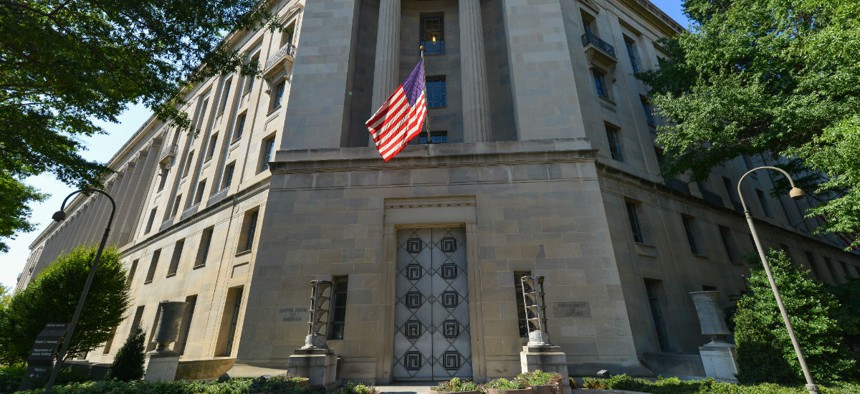
Shutterstock.com
Criminal Referrals for Leaks of Sensitive Government Information Have Surged
The number of criminal prosecutions for leakers only scratches the surface of those who disclose government secrets, however.
Leaks are more than fodder for congressional debate and presidential tweets—leaks of classified information remains an ongoing and growing problem, with the number of criminal reports related to the unauthorized disclosure of sensitive information surging over the past two years, according to Justice Department data recently obtained by the Federation of American Scientists.
Justice fielded 120 criminal leak referrals in 2017, and 88 in 2018. During calendar years 2009 through 2015, the highest number of leaks reported in any one year was 55, and the average was 39.
The uptick in leak cases doesn’t necessarily mean more leaks are happening today than before, but it does shine a light on the reality of the Justice Department’s battle to enforce criminal prosecutions against leaks. The figures obtained by the Federation of American Scientists only reveal leaks of classified information subject to criminal prosecution, not leaks that weren’t referred for criminal prosecution, and which may have been handled administratively. The figures also don’t break down the leaks by agency.
“During the Obama administration, there was a sea change within the Department of Justice and the White House: Those who went public with classified information were going to be vigorously prosecuted. And they were,” said Christopher Burgess, 30-year CIA veteran and security professional.
Burgess specifically notes the 2007 case of John Kiriakou, a CIA operations officer who shared information about the CIA’s advanced interrogation techniques with news reporters. In 2012, he was indicted for a violation of the Intelligence Identities Protection Act after he provided the true identity of a CIA clandestine officer to a reporter. He pled guilty and was sentenced to 30 months in prison.
In 2010, Jeffrey Sterling, another former CIA operations officer, shared information about “Operation Merlin,” a covert operation under the Clinton Administration against Iran’s nuclear program. He spent three years in prison.
Chelsea Manning, who leaked 750,000 classified and sensitive documents, pled guilty to 10 charges and was convicted at trial of a total of 17 charges, and sentenced to 35 years in prison. She served just 7 years before President Obama commuted her sentence.
Manning is a rare example of a leaks case that actually went to trial. Few cases do. Most are resolved through plea arrangements. Whether that’s due to the government’s desire to preserve secrecy or the need for expediency, plea deals, not extended court battles, are the norm. Harold Martin recently accepted a plea agreement with a nine year prison sentence—after 20 years of hoarding classified information and amassing more than 50 terabytes of classified information. Reality Winner walked out of her office with classified material stuffed into her pantyhose, and walked away with a 63 month prison sentence.
The number of criminal prosecutions for leakers only scratches the surface of those who disclose government secrets, however. Some hide under the umbrella of whistleblowing, in other cases the government is just uninterested or perhaps unable to move the case to prosecution. When it comes to whistleblower cases, it’s important to remember that, just as there are official protections for whistleblowers under the law, there are also procedures for properly reporting information. Revealing classified or sensitive information to anyone without a clearance or the authorization to receive it is not whistleblowing—it’s leaking.
The case of Julian Assange, who has not been charged with espionage, will put the contrast between leaks and whistleblowing back in the spotlight. Ecuador withdrew Assange’s asylum this month and British authorities arrested him at the London embassy where he had been living; shortly after the arrest, the U.S. government unsealed an indictment against Assange. The charges don’t directly relate to the classified information published by Wikileaks, but rather Assange’s alleged conspiracy with Manning to bypass protocols in the Secret Internet Protocol Router Network, better known as the SIPRNet.
“On or about March 8, 2010, Assange agreed to assist Manning in cracking a password stored on Department of Defense computers connected to the [SIPRNet]…” the indictment alleges.
The decision not to prosecute Assange for espionage or charges related to the leaking of classified information highlights just how difficult enforcing those charges can be. Despite the serious ramifications of leaking classified information, securing criminal convictions remains rare, even as the number of cases being criminally prosecuted increases.
The nuance between leaking classified information, whistleblowing and espionage means most violators find themselves prosecuted for security violations or breaches of employment discovered in the course of investigating a leak, rather than the more complicated (and harder to prosecute) charge of espionage.
Why does that matter? As security clearance attorney and ClearanceJobs contributor Sean Bigley pointed out, “Once classified information is placed into the public domain, the damage to U.S. national security is impossible to roll back.”
Security clearance holders who value both integrity and national security should take special care to make sure they’re on the right side of the law before disseminating information, because there is a difference between leaking information and blowing the whistle. Whistleblower protections do exist, but a whistleblower will not be protected if he or she violated the law and policy in their attempt to report something they didn’t feel was right.
NEXT STORY: EPA Clashes With IG Over Destroyed Documents






